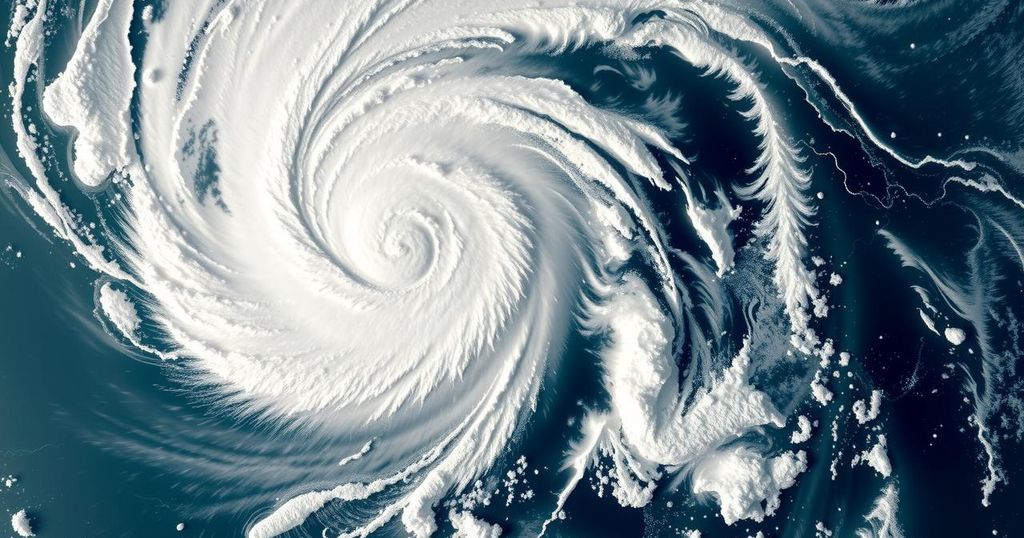Weather
World news
AFRICA, ANALANJIROFO, BEFANDRIANA AVARATRA, BETSIBOKA, BOENY, FORECAST, MADAGASCAR, MAMPIKONY, METEOROLOGY, NATIONAL METEOROLOGICAL SERVICE, NATIONAL OFFICE FOR RISK AND DISASTER MANAGEMENT, NATIONAL RISK ATLAS, NATURAL DISASTERS, RAIN, TEMPERATURE, WEATHER
Stella Nguyen
0 Comments
Tropical Cyclone Dikeledi: Impact and Humanitarian Response in Madagascar
Tropical Cyclone Dikeledi is set to impact northern Madagascar, with expected heavy rainfall and wind gusts causing severe weather conditions. Approximately 45,000 people may be directly affected. Preparations are being made by humanitarian partners, and awareness initiatives have begun in Mozambique.
Tropical Cyclone Dikeledi is poised to make landfall in the Vohémar and Antsiranana districts of northern Madagascar on January 11, 2025. Preliminary reports suggest that heavy rainfall has commenced, with projections indicating that this weather system could affect at least 45,000 individuals. In preparation for potential impacts, humanitarian partners have mobilized emergency resources and heightened awareness campaigns, especially in the neighboring country of Mozambique. The situation is being closely monitored by various national and international agencies.
As of 10:00 a.m. local time, Cyclone Dikeledi was positioned 152 kilometers east of Vohemar, with sustained winds reaching 120 kilometers per hour. The anticipated landfall is expected to generate significant rainfall that may lead to flooding and landslides in the affected regions. Rainfall forecasts estimate that Antsiranana may receive up to 170 mm of rain, although this volume is expected to be less than that experienced during the previous Cyclone Gamane in April 2024. Officials have activated cyclone warnings in vulnerable districts and prepared contingency measures, categorizing alerts by risk levels.
Emergency response activities are currently underway, focusing on disseminating early warning information to at-risk communities. Existing emergency stocks from prior cyclones have been mobilized to provide immediate support, and cash assistance has been distributed to approximately 9,000 households. Additionally, food supplies totaling 350 tons are being transported by boat to ensure immediate access. Emergency coordination centers have been activated, and extensive preparations for health, education, and shelter support are being implemented.
Health partners have pre-positioned medical supplies and specific kits intended for reproductive health in the Sava region to address any health-related emergencies that may arise. Efforts to ensure sufficient access to clean water and sanitation services are also ongoing; however, the supplies remain critically limited. Simultaneously, partners are distributing agricultural resources to bolster food security, although logistical hurdles persist due to previous cyclone-related damage to infrastructure.
On January 10, 2025, Mozambican authorities commenced awareness initiatives regarding the approach of Cyclone Dikeledi, estimating that it may traverse the Mozambican channel on January 12. Nevertheless, current analyses indicate no immediate threat to coastal and mainland areas in Mozambique.
Cyclones are significant meteorological phenomena that can cause extensive disruption and humanitarian crises, particularly in vulnerable regions like Madagascar and Mozambique. Tropical Cyclone Dikeledi is anticipated to impact northern Madagascar, a region that has previously faced severe weather events, including Cyclone Gamane in April 2024. The local government and humanitarian agencies are engaged in strategic planning and risk mitigation efforts to address the needs of populations that may be impacted by cyclones and to ensure preparedness for rapid response in times of crisis. The coordination of response mechanisms is vital in minimizing the adverse effects of such natural disasters.
In conclusion, Tropical Cyclone Dikeledi presents a significant risk to northern Madagascar, with projections indicating severe weather conditions that could affect tens of thousands of individuals. Local and international partners are actively preparing for the cyclone’s impact by mobilizing resources and implementing early warning systems. The situation continues to evolve, and authorities are prioritizing response efforts to ensure the safety and well-being of affected populations while coordinating with neighboring countries to mitigate further risks.
Original Source: reliefweb.int




Post Comment